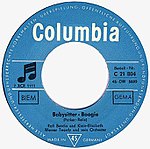Baby sittin 'boogie
Baby Sittin 'Boogie is a pop song written by the American Johnny Parker. In the US, the version sung by Buzz Clifford came in at number six on the charts. A German-language version with Ralf Bendix became a number one success.
Buzz Clifford
The American songwriter Johnny Parker, born in 1922, had been known as a successful composer since the early 1950s. With the song I Wanna Love You sung by Ames Brothers , he had his first major success in 1952. In his song Baby Sittin 'Boogie a sittendes couple amazed at the baby from Boogie thrilled to accompany the dancing baby sitting with his baby singing. Parker's song was produced on October 31, 1960 at Columbia Recording Studio in New York with the then unsuccessful 18-year-old Buzz Clifford. As a special gag, the voice of the Parker baby was included. On November 21, Columbia Records released the track on single No. 41876. On January 9, 1961, Baby Sittin 'Boogie appeared for the first time on the Hot 100 of the US music magazine Billbord . The title reached its best listing on Billboard on March 13, 1961 at number six. He was represented in the Hot 100 for a total of 14 weeks.
In Great Britain the record company Fontana distributed the Baby-Sittin'-Boogie single. There it appeared in February 1961, and the track Baby Sittin 'Boogie was listed in the top 30 on March 4 by the music magazine New Musical Express . It stayed there for ten weeks and had its best rating at 14. Buzz Clifford's success also appeared in Germany, where the record company Philips had decided to give the original the German title Babysitter-Boogie . In the music market , the song rose to number three, and thus reached the third-best rating internationally after Canada and the Netherlands (second place).
Ralf Bendix
On February 28, 1961, the German-language version Babysitter-Boogie with Ralf Bendix as the singer was produced in the Electrola Studio in Cologne under the direction of Hans Bertram . Bendix had belonged to the elite of German pop singers since the mid-1950s, but had strayed from the road to success since 1959. The author of the German text was the still unknown Joachim Relin (1964 Shake Hands for Drafi Deutscher ). He is about a male babysitter whose baby sings the "babysitter boogie woogie song" while changing diapers. In the Cologne production you can hear a laughing baby, it's the child of producer Bertram. The German Columbia published the babysitter boogie in early March 1961 on the single No. 21804 with the artist name "Ralf Bendix and Klein-Elisabeth". The music magazine Musikmark listed the title together with the English Buzz Clifford version in the top 50 for the first time on March 25th, and Ralf Bendix and Klein-Elisabeth in first place on April 22nd. They stayed there for five weeks and were in the top 50 for a total of 26 weeks. In Germany, Babysitter-Boogie received a gold record for 500,000 copies sold . In the fall of 1962, Heinz Gietz and Joachim Relin wrote a follow-up with the title Babysitter-Twist , which also made it into the German charts (29th place).
More cover versions
While no single cover versions of Baby Sittin 'Boogie were known in the USA , several versions came onto the market in Germany. The German offshoot of RCA Records brought out a single with the English version with the unknown singer Tim Reynolds. In German sang the babysitter boogie Jack Terry on Polydor and Dick Robby on the cheap label Baccarola and the Rodgau Monotones .
literature
- Billboard Magazine , issues January 9 through April 10, 1961
- Günter Ehnert (Ed.): Hit Records British Chart Singles 1950-1965 Taurus Press 1995, ISBN 3-922542-32-8 .
- Günter Ehnert (Ed.): Hit balance sheet German chart singles 1956–1980. Taurus Press 1987, ISBN 3-922542-24-7 .
swell
- ^ Günter Ehnert: Hit balance sheet - German chart singles 1956-1980 . 1st edition. Verlag popular music-literature, Norderstedt 2000, ISBN 3-922542-24-7 , p. 443 .

